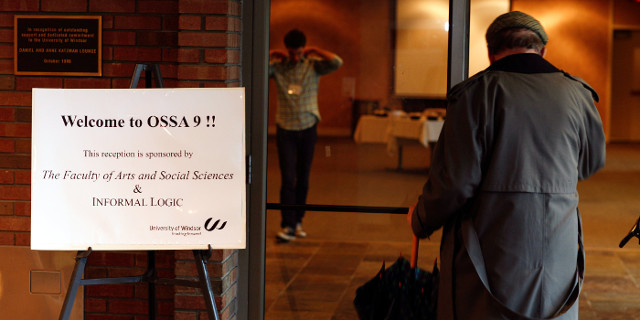
Location
University of Windsor
Document Type
Paper
Keywords
Austin, argumentation, critical discourse analysis, fallacies, Hamblin, pragmatics, rhetoric
Start Date
18-5-2011 9:00 AM
End Date
21-5-2011 5:00 PM
Abstract
After C. L. Hamblin's groundbreaking work Fallacies (1970), re-interpreting what used to be known as "mistakes in reasoning" or "bad arguments" since Aristotle (On Sophistical Refutations), the study of fallacies started to bloom, coming up with ever new perspectives and conceptualizations of what should count as a mistake in reasoning and argumentation, and why a certain kind of reasoning should at all be considered a mistake (Woods & Walton 1989, van Eemeren & Grootendorst 1992, etc.). This paper will be concerned with two questions. First, an epistemological one: do we (unintentionally) commit fallacies, or do we (intentionally) use them? Secondly, a methodological one: when we (philosophers, sociologists, discourse analysts, ...) detect a fallacy, on what conceptual grounds do we differentiate between committed and used fallacies? Aren't we forced to commit (or use?) "fallacies" whenever we talk about other people, their views, or their work? Examples from Critical Discourse Analysis will be used to extensively illustrate this point.
Creative Commons License

This work is licensed under a Creative Commons Attribution 4.0 International License.
Fallacies: do we “use” them or “commit” them? Or: is all our life just a collection of fallacies?
University of Windsor
After C. L. Hamblin's groundbreaking work Fallacies (1970), re-interpreting what used to be known as "mistakes in reasoning" or "bad arguments" since Aristotle (On Sophistical Refutations), the study of fallacies started to bloom, coming up with ever new perspectives and conceptualizations of what should count as a mistake in reasoning and argumentation, and why a certain kind of reasoning should at all be considered a mistake (Woods & Walton 1989, van Eemeren & Grootendorst 1992, etc.). This paper will be concerned with two questions. First, an epistemological one: do we (unintentionally) commit fallacies, or do we (intentionally) use them? Secondly, a methodological one: when we (philosophers, sociologists, discourse analysts, ...) detect a fallacy, on what conceptual grounds do we differentiate between committed and used fallacies? Aren't we forced to commit (or use?) "fallacies" whenever we talk about other people, their views, or their work? Examples from Critical Discourse Analysis will be used to extensively illustrate this point.

